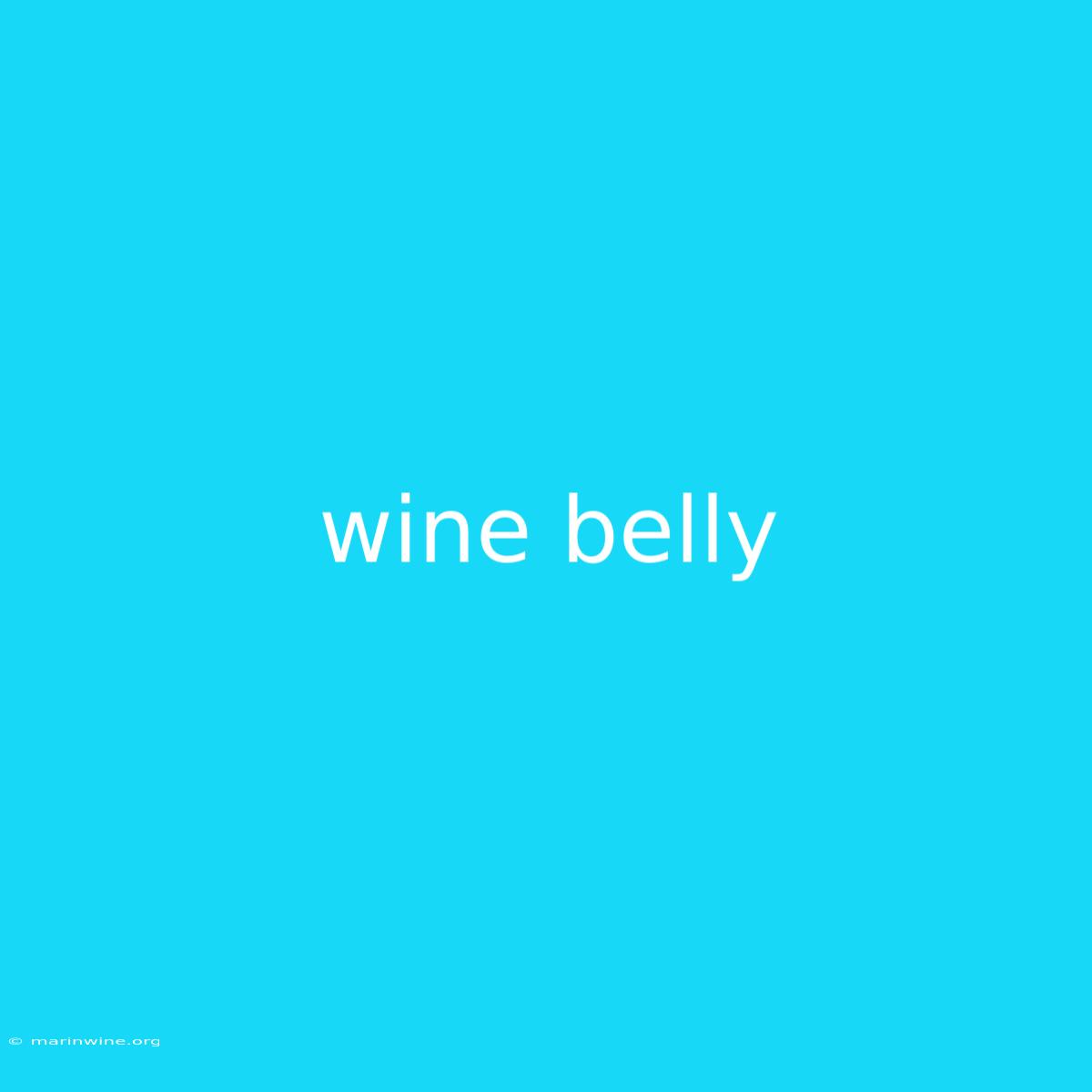Is Wine Really Making You Fat? Uncorking the Truth About Wine Belly
Have you noticed your waistline expanding after enjoying a glass (or two) of wine? Many people associate excessive alcohol consumption with a protruding belly, often dubbed the "wine belly." But is this just a myth, or is there some truth to this phenomenon?
Why It Matters:
Understanding the connection between wine consumption and belly fat is crucial for maintaining a healthy weight. It's not just about aesthetics but also about reducing the risks associated with abdominal obesity, such as heart disease, type 2 diabetes, and certain cancers. This article explores the science behind the "wine belly" and provides practical tips to enjoy wine responsibly while managing your waistline.
Key Takeaways:
| Takeaway | Description |
|---|---|
| Wine can contribute to belly fat. | Wine contains calories and can lead to increased calorie intake, especially when consumed in excess. |
| Alcohol affects metabolism. | Alcohol can disrupt the body's ability to burn fat and may even promote fat storage in the abdominal region. |
| Wine's impact is influenced by factors. | Individual factors such as genetics, diet, and overall lifestyle play a role in how wine affects your body composition. |
| Moderation is key. | Enjoying wine in moderation, alongside a healthy diet and regular exercise, can help manage your weight and minimize the risk of "wine belly." |
What is Wine Belly?
"Wine belly" is a term used to describe the accumulation of abdominal fat, often associated with regular wine consumption. While the term suggests that only wine is responsible, it's more accurate to say that excessive alcohol consumption in general, including wine, can lead to belly fat gain.
The Science Behind Wine Belly:
Several factors contribute to the development of "wine belly":
1. Calorie Content:
Wine contains calories, primarily from carbohydrates (sugar) and alcohol. Even a small glass of wine can add up to 100-150 calories. If you consistently consume more calories than you burn, it can lead to weight gain, including belly fat.
2. Alcohol's Impact on Metabolism:
Alcohol can disrupt the body's normal metabolic processes, making it more challenging to burn fat. When alcohol is present, the liver prioritizes its breakdown, leading to a decrease in fat oxidation. This can contribute to fat storage, particularly in the abdominal area.
3. Hormonal Effects:
Alcohol consumption can also influence hormones like cortisol, which plays a role in stress and fat storage. High cortisol levels may lead to increased fat deposition in the belly area.
Beyond Wine:
It's important to remember that the "wine belly" isn't solely caused by wine. Other factors contributing to abdominal fat include:
- Poor Diet: High-calorie, processed foods, sugary drinks, and a lack of fiber can all contribute to belly fat gain.
- Lack of Physical Activity: Regular exercise is essential for burning calories and maintaining a healthy weight.
- Genetics: Some individuals may be more genetically predisposed to store fat in the abdominal area.
- Stress: Chronic stress can lead to hormonal imbalances, affecting fat storage.
Managing Your Waistline:
While enjoying a glass of wine can be part of a balanced lifestyle, it's important to do so responsibly to avoid excess belly fat:
1. Moderation:
For women, the recommended daily limit is one drink, and for men, it's two. It's essential to be mindful of your calorie intake and choose wines with lower alcohol content and fewer added sugars.
2. Healthy Diet:
Focus on consuming whole, unprocessed foods, fruits, vegetables, lean protein, and healthy fats. Limit sugary drinks, processed foods, and high-calorie snacks.
3. Regular Exercise:
Engage in at least 30 minutes of moderate-intensity exercise most days of the week. Include strength training exercises to build muscle mass, which can increase your metabolism.
4. Manage Stress:
Practice stress-reduction techniques such as yoga, meditation, or spending time in nature. Adequate sleep is also crucial for maintaining hormonal balance and reducing stress levels.
FAQ:
Q: How much wine is too much?
A: It's recommended to limit alcohol intake to one drink per day for women and two drinks per day for men. Excessive consumption can lead to health problems, including weight gain.
Q: Can I still enjoy wine if I'm concerned about my belly?
A: Yes, but moderation is key. Choose wines with lower alcohol content and fewer added sugars. Balance wine consumption with a healthy diet and regular exercise.
Q: What if I already have a "wine belly"?
A: It's not too late to make changes! By adopting a healthy lifestyle that includes a balanced diet, regular exercise, and reduced alcohol consumption, you can gradually reduce belly fat and improve your overall health.
Tips for Enjoying Wine Without the Belly:
- Choose dry wines with lower alcohol content.
- Opt for wines with fewer calories and added sugars.
- Sip slowly and savor your wine.
- Pair your wine with healthy snacks or meals.
- Be mindful of portion sizes.
- Consider switching to a wine spritzer or a low-calorie alternative.
Summary:
While wine can be enjoyed as part of a balanced lifestyle, excessive consumption can contribute to belly fat gain. Understanding the science behind "wine belly" and adopting healthy habits can help you manage your weight and enjoy wine responsibly.
Closing Message:
The key to preventing a "wine belly" lies in balance and moderation. By making informed choices about your diet, exercise, and alcohol consumption, you can enjoy wine without sacrificing your waistline or your health.

